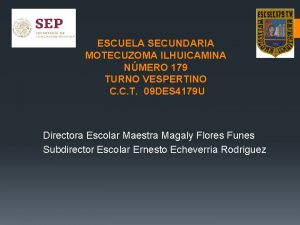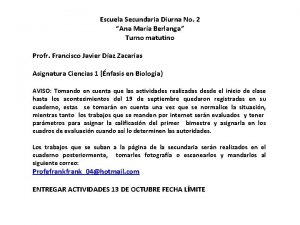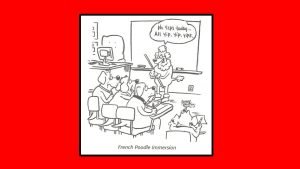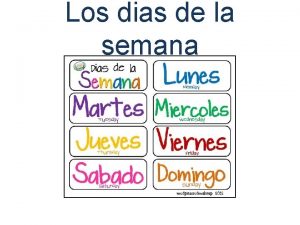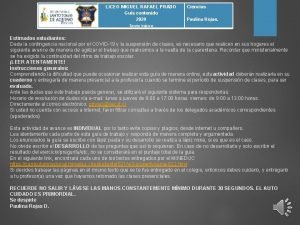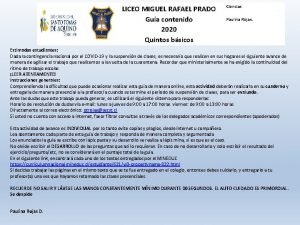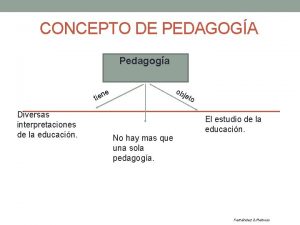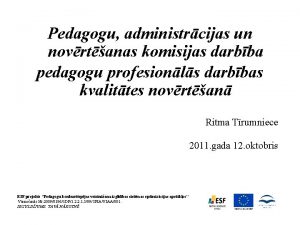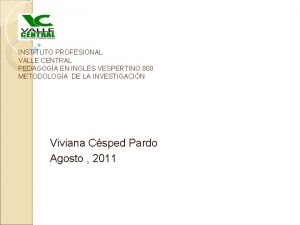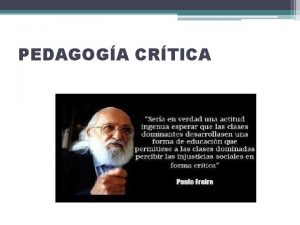INSTITUTO PROFESIONAL VALLE CENTRAL PEDAGOGA EN INGLS VESPERTINO















- Slides: 15

INSTITUTO PROFESIONAL VALLE CENTRAL PEDAGOGÌA EN INGLÈS VESPERTINO 200 GRAMÀTICA II Viviana Césped Pardo August , 2011

UNIT 1: ADVERBIALS �Manner �Time �Frecuency �Probability �Duration �Degree

UNIT 1: ADVERBIALS �Main Points �Adverbials are usually adverbs, adverb phrases, or prepositional phrases. �Adverbials of manner, place, and time are used to say how, where, or when something happens. �Adverbials usually come after the verb, or after the object if there is one. �The usual order of advrerbials is manner, then place, then time.

1. An adverbial is often one word , and adverb. �Sit there quietly, and listen to this music. �However, an adverbial can also be a group of words: �An adverb phrase �He did not play well enough to win. �A prepositional Phrase �The children were playing in the park.

�A noun group , usually a time expression Come and see me next week.

2 You use an adverbial of manner to describe the way in which something happens or is done. They looked anxiously at each other She listened with great patience as he told his story.

�You use an adverbial of place to say where something happens. �A plane flew overhead. �No birds or animals came near the body. �You use an adverbial of time to say when something happens. �She will be here soon. �He was born on 3 April 1925.

3 You normally put adverbials of manner , place and time after the main verb. She sang beautifully. The book was lying on the table. The car broke down yesterday

If the verb has an object, you put the adverbial after the object. �I did learn to play a few tunes very badly. �Thomas made his decision immediately. �He took the glasses to the kitchen.

�If you are using more than one of these adverbials in a clause, the usual order is manner, then place, then time. �The were sitting quite happily in the car. (manner and place) �She spoke very well at the village hail last night. (manner, place and time)

4 You usually put adverbials of frequency, probability, and duration in front of the main verb. She occasionally comes to my house. You have very probably heard the news by now. They had already given me the money A few adverbs of degree also usually come in front of the main verb. She really enjoyed the party.

5 When you want to focus on an adverbial, you can do this by putting it in a different place in the clause: �You can put an adverbial at the beginning of a clause, usually for emphasis. �Slowly, he opened his eyes. �In September I travelled to California. �Next to the coffee machine stood a pile of cups.

�You can sometimes put adverbs and adverbs phrases in front of the main verb for emphasis, but not prepositional phrases or noun groups. �He deliberately chose it because it was cheap. �I very much wanted to go with them.

�You can change the order of adverbials of manner, place and time when you want to change the emphasis. �They were sitting in the car quite happily. (place, manner) �At the meeting last night, she spoke very well. Place, time, manner)

 Using discussion protocols plc
Using discussion protocols plc Blog escolar secundaria 95 victor hugo
Blog escolar secundaria 95 victor hugo Ana maria berlanga secundaria
Ana maria berlanga secundaria Language respuestas
Language respuestas Meses del año en kaqchikel
Meses del año en kaqchikel El tiempo
El tiempo Preguntas para la ciudadana en ingls
Preguntas para la ciudadana en ingls Preguntas de la ciudadana en ingls
Preguntas de la ciudadana en ingls 100 preguntas para la ciudadana 2020 en ingls
100 preguntas para la ciudadana 2020 en ingls Preguntas de ciudadana 2020 en ingls
Preguntas de ciudadana 2020 en ingls Ingls
Ingls Preguntas para la ciudadana en ingls
Preguntas para la ciudadana en ingls Pedagoga por amor
Pedagoga por amor Que es pedagoga
Que es pedagoga O que faz um pedagogo
O que faz um pedagogo Pedagoga darba pašvērtējuma veidlapa
Pedagoga darba pašvērtējuma veidlapa

